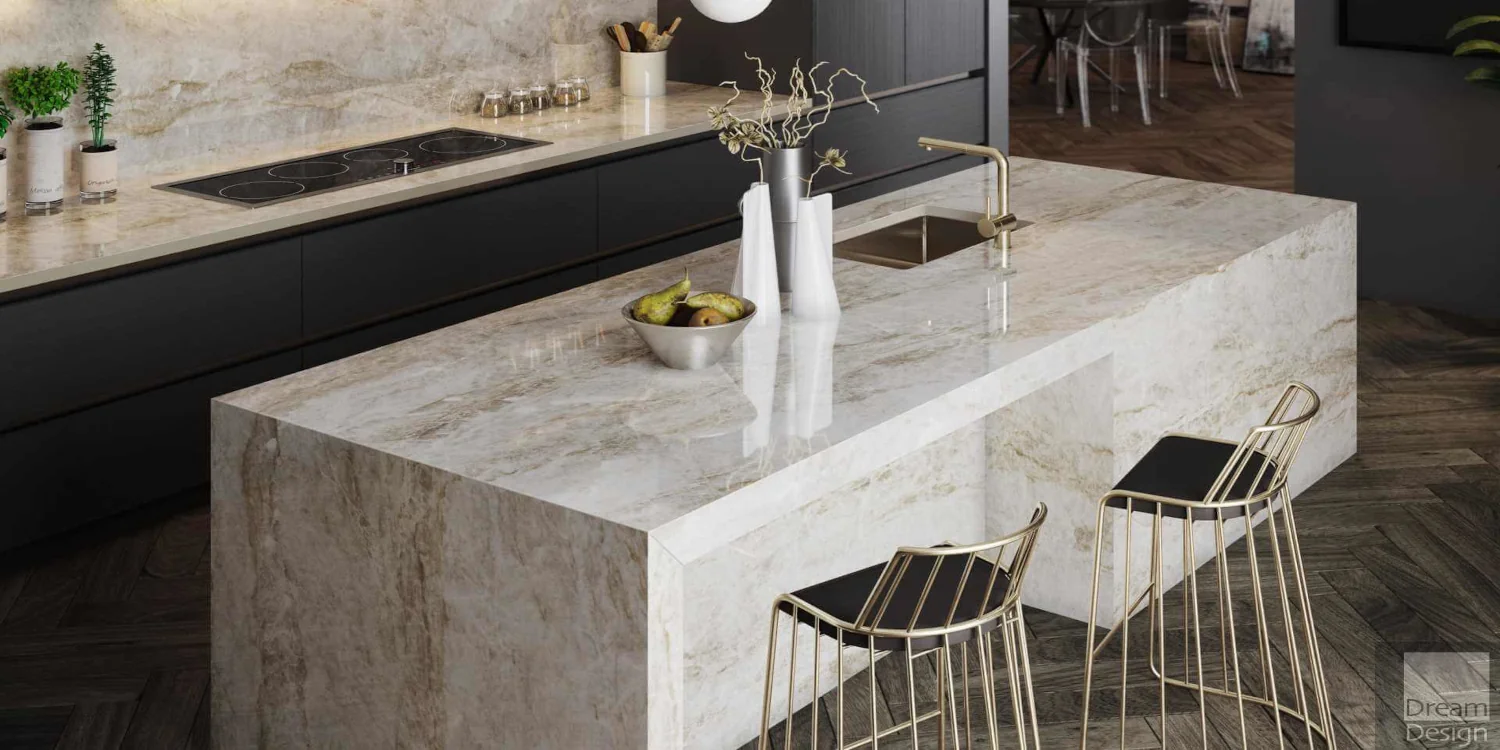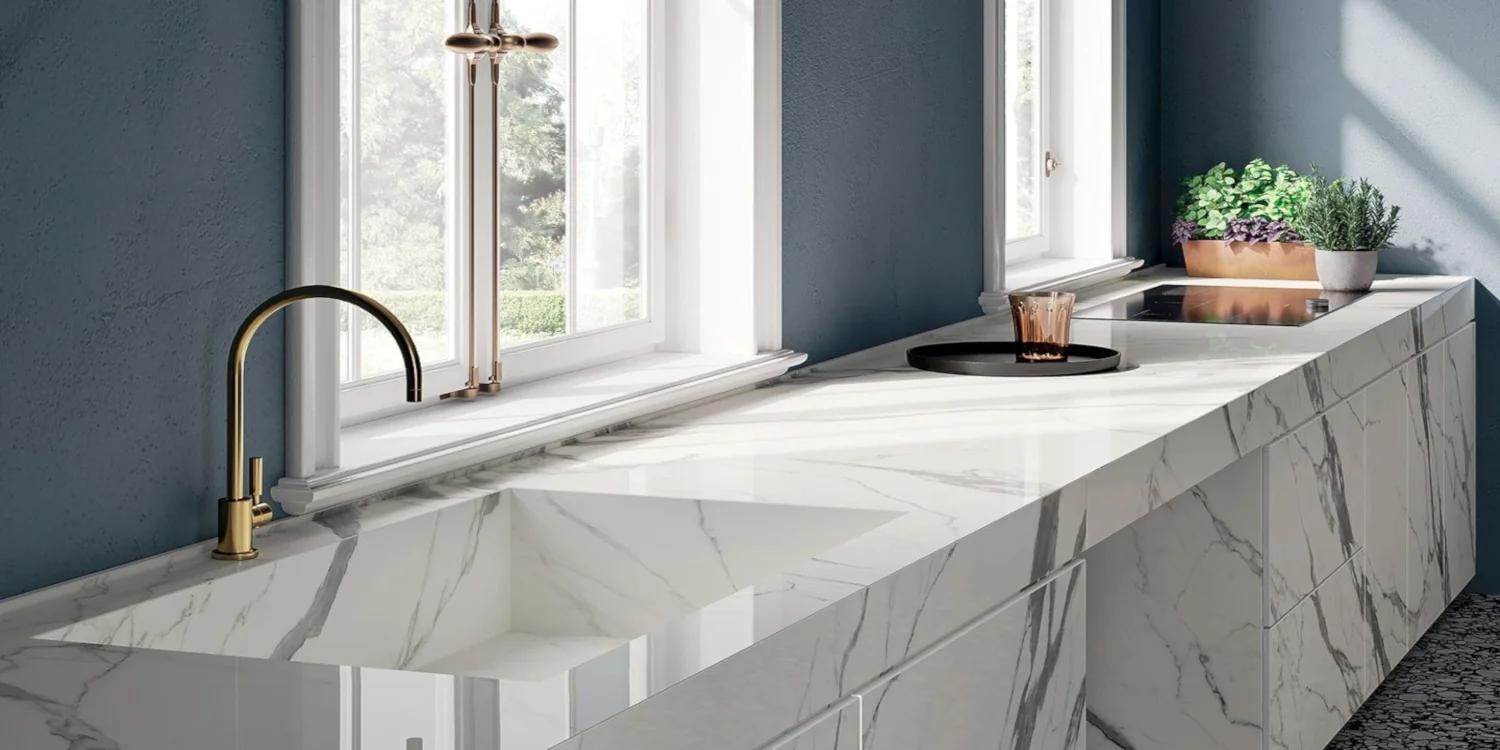Dekton

Dekton countertops and other surfaces are made of a blend of raw materials to produce a technologically advanced surface. More than 20 natural minerals are used with new manufacturing process that heats up Dekton stone to a specific temperature to make a near-perfect bond for ultra-durability and resistance to stains.
The new production technology allows the new surface to be be extra large or super compact, ultra thin or extra thick. It prevents micro-defects that cause tensions or weak points, so it has almost zero porosity. This means it can be used for any application in extreme conditions (indoors or outdoors) for façades or floors, not just interior countertops and surfaces.
The surface is available in a wide range of Dekton colors and its application goes beyond kitchen countertops because it is so strong and durable.
Porcelain

Around the world, porcelain has become a popular choice for kitchen countertops in last decade. It is a compact mixture of raw minerals and pigments, manufactured in a way that makes the product very durable. It is scratch-resistant, stain-resistant, and heat-resistant. In terms of impact-resistance, porcelain can chip along the edge if impacted with enough force.
Similar to Dekton and unlike granite and other natural stones, porcelain slabs are relatively consistent from slab to slab since it is an engineered stone. There are many color and patterns options available, but unlike Silestone quartz and Dekton, the pattern is only visible on the surface. The inside of the countertop surface does maintain the pattern, so polished edges will look different that the face of the material.
Though similar in their durability as a countertop surface and often mistaken as being the same or similar, they are unique materials with its own distinct pros and cons (benefits and disadvantages).
Similarities of Dekton & Porcelain
Will Dekton or Porcelain burn? Can you put hot cookware on the countertops?
You sure can!
Stains… what about countertop stains?
And for those who worry about stains, it’s a non-issue with Porcelain and Dekton. Just wipe up the liquid when you can and forget about it. This is largely due to the non-porous nature of these surfaces.
Can I use both surfaces outdoors?
Both are awesome for outdoor spaces because they are both resistant to UV rays and will not fade or discolor over time.
Cleanliness (Bacteria) of Dekton compared to Porcelain…
Maintenance is a cinch for both options with everyday household cleansers being all that’s necessary. Warm water and a soft cloth will be perfectly suitable for daily clean-up.
Maintenance of Dekton and Porcelain…
Avoid harsh cleansers with degreasing solutions or bleach as they can negatively impact the surface. Use a non-abrasive cloth or sponge and try not to let spills from acidic beverages like coffee, red wine, and citrus dry on the surface to prevent sticky residue.
Aesthetics of Dekton vs Porcelain…
Both have many color and pattern options. Porcelain probably wins this because almost any color and pattern can be applied to a porcelain slab.
Differences Between Dekton and Porcelain
Composition: Winner is Dekton
Dekton is made by combining quartz, porcelain, and glass into a homogenous material that is the same pattern all the way through and in ensuing slabs. The materials are compressed under intense pressure to create a durable surface.
Porcelain bonds white clays and other materials (less glass than Dekton) with high heat and pressure to form a solid slab. Pigmented glazes are then added to create different patterns and colors on the porcelain slab, so it is not the same through and through. Chips will show the core color and the not the color or pattern you chose. They will be glaringly visible. And edges can look different that the face of the material, so options are limited to square or mitered edges.
Installation Costs: Winner is Dekton
Porcelain slabs can be fragile during the fabrication and installation process. They thinner than Silestone but about the same as thin Dekton options. Porcelain is relatively difficult to cut and customize compared to Dekton. Porcelain requires special tools and considerable skill to get clean cuts with chip free seams, which is why it can be difficult to find qualified installers and fabricators. This drives up the cost!
Performance: Dekton beats Porcelain
Both porcelain and Dekton are very resistant to scratches, so you can cut and chop directly on the surface… just watch out for your blades and be sure to have a blade sharpener handy. Also, keep in mind that they are not made of diamond, so they are not impervious to extreme forces or aggressive conditions.
Dekton is made by putting 25,000 tons of pressure on the material to make nearly every atom and molecule bond together. That’s 50,000,000 pounds of pressure, which simply makes it stronger and more durable than Porcelain.
Some comparisons have said the ultra-slim version of Dekton have cracked when hit with a good amount of force, but the problem with those opinions is that the ultra thin Dekton slab is not meant to be used as a countertop. It’s for cladding or other venires.
Sealing Countertops: Dekton Beats Porcelain
Some Porcelain slabs require sealing and Dekton does not.
Warranty: Dekton & Porcelain About The Same
In terms of warranty, some porcelain countertop manufacturers offer a lifetime guarantee with exceptions while Dekton is 25 years. Neither, however, will cover chipping or cracking from accidental misuse.
Cost of Dekton Counters Compared to Porcelain Tops
Porcelain varies widely. Dekton is pretty consistent.
Environmental Impact: Porcelain Beats Dekton by a Little
Dekton uses same materials as porcelain plus other binders, so in terms of materials used, porcelain countertops wins. The production process has not been analyzed but that would be influenced more by the choices of the manufacturer (multiple companies produce porcelain countertops while Dekton is made exclusively by Cosentino) and not the countertop surface itself.
Value of Porcelain Countertops vs Dekton
Dekton is a relatively new innovation. Porcelain has been around for millennia. Since it’s a more recent innovation, you can expect a slightly higher price tag. Another variable to consider is slab size. Dekton slabs are 3200×1440 while porcelain is larger at 3200×1600. One would need additional slabs of Dekton to match the size of a space designed with porcelain. Keep in mind that the fabrication, installation and customization of porcelain is steeper because of the rarity and expense of professional installers of porcelain countertops that are difficult to cut.
Dekton vs Porcelain Conclusion
If price is the only factor, Porcelain is the clear winner.
But does the lower cost of Porcelain justify the trade off in higher installation costs and lake of uniformity and performance in the material compared to Dekton?
NO WAY! DEKTON WINS.
